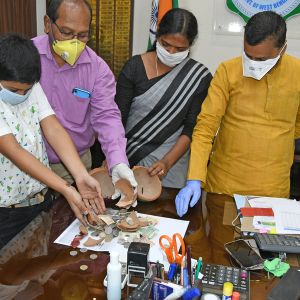In our society, we are always encouraged to donate money to various charitable funds. Even though it is a matter of choice, most people start contributing a certain amount after achieving financial stability. Most cultures believe in giving back more than they receive from society. Even though charity can come in any form, it is easier for people to donate a certain amount that can help people further. Recently many people have lost their jobs and are left without any means to sustain livelihood. To deal with similar situations, the Government of India has different constitutional acts in place to encourage people to come forward and donate to organizations. Section 80G of Income Tax Act states that the amount contributed is liable for tax reprieve during the calculation of taxable income at the end of the financial year. However, it is essential to note that all charitable organisations are not liable for tax deductions.

Things we covered for you
What is Section 80G of Income Tax Act?

Section 80G of the Income Tax Act allows tax reprieve to donate to certain relief funds or charitable organizations. However, all donations are not considered under this act. The assessee must check the eligibility of the organization while calculating its total taxable income. Tax deduction under Section 80G can be claimed by individual taxpayers or any institutions or partnership firms.
It is essential to note that the donations made as clothes/ food/ books or any other items do not qualify for a tax deduction.
Which Mode of Payment Makes Section 80G Applicable?

Tax deduction under Section 80G of the income tax act, can only be claimed when the amount is contributed via cash, cheque, or a bank draft. Any other kind of payments, including in-kind payments consisting of food/ medicines/ clothes, do not qualify for a tax deduction as per the law. If the amount donated exceeds Rs. 10,000 in the form of cash, tax deduction is not allowed.
Read: PAN Card: Uses and Importance, How to Apply & Eligibility
In the post-financial year 2017-18, if the donation exceeds Rs. 2,000 in cash, the tax deduction is not allowed. However, if a person donates the same amount via a cheque or bank draft, it will qualify for the tax deduction.
Adjusted Gross Total Income Explained
In this context, adjusted gross total income refers to your total income less the following amounts:
- Deductible amount u/s 80C to 80U (but not Section 80G)
- Income from which no tax is due
- GTI includes long-term capital gains under Sections 112 and 112A.
- Section 111A applies to short-term capital gains.
- Income as defined in Sections 115A, 115AB, 115AC, and 115AD.
The Process to Claim Tax Deduction Made Under Section 80G
Details needed to claim the tax deduction under Section 80G are as follows –
- Name of the assessee
- Address of the assessee
- Amount donated to the charitable organization or relief fund
- PAN of the assessee
Even though it is unnecessary to save the donation receipt under Section 80G, for claiming a tax deduction. It is always good to keep a proper record of all the donations made during that particular financial year.
Documents required for Claiming tax deduction under Section 80G
Receipt: To claim a deduction under Section 80G, you must have a donation receipt to back up your claim. The receipt should include information such as the trust’s name, address, PAN, registration number, and the name of the donor, as well as the amount of the donation and mode of payment.
Form 58 is required if the donation qualifies for a full tax deduction. The donor should also demand Form 58 from the trust. Form 58 contains information about the project’s cost, an authorised amount for the project, and so on. If you don’t have Form 58, your claim for deduction may be denied regardless of receipt.
Read: What Is a Good Cibil Score? Learn Seven Ways to Improve Credit Score
Trust Registration Number: Every trust registered with the IT department under Section 80G is assigned a Registration Number. It is required to include that number on the receipt. This registration is only valid for a limited time. As a result, the receipt must include both the registration number and the validity period. Photocopy of the trust’s 80G registration certificate: When obtaining a receipt, users should insist on a photocopy of the trust’s 80G registration certificate.
List of Tax-Exempt Donations
Next, we will look at tax-exempt donations that are considered tax-exempt or ones which are eligible for a 50% deduction.
List of Donations That are Eligible for a 50% Deduction Without a Qualifying Limit
Donations eligible for a 50% deduction without any qualifying limit are-
- Jawaharlal Nehru Memorial Fund set up by The Earl Mountbatten of Burma
- Prime Minister’s Drought Relief Fund to aid people against any natural or man-made disasters
- Indira Gandhi Memorial Trust was established in memory of former Prime Minister of India
- Rajiv Gandhi Foundation established in 1991
Donations That are Eligible for a 100% Deduction Without a Qualifying Limit
Here are the donations that are eligible for a 100% deduction without any qualifying limit:
- National Defence Fund set up by the Central Government
- An approved university/educational institution of National eminence
- Prime Minister’s National Relief Fund
- Zila Saksharta Samiti constituted in any district under the chairmanship of the Collector of that district
- National Foundation for Communal Harmony
- National Illness Assistance Fund
- Fund set up by a State Government for medical relief to the poor people
- National Trust for Welfare of Persons with Autism, Cerebral Palsy, Mental Retardation, and Multiple Disabilities
- National Blood Transfusion Council or any active Blood Transfusion Council set up by the state government
- National Sports Fund
- Fund for Technology Development and Application
- National Cultural Fund
- National Children’s Fund
- The Army Central Welfare Fund or the Indian Naval Benevolent Fund or the Air Force Central Welfare Fund, Andhra Pradesh Chief Minister’s Cyclone Relief Fund, 1996
- Chief Minister’s Relief Fund or Lieutenant Governor’s Relief Fund for any State or Union Territory
- The Maharashtra Chief Minister’s Relief Fund – October 1, 1993, and October 6, 1993
- Chief Minister’s Earthquake Relief Fund set up in Maharashtra
- Any trust, organisation, or fund eligible to provide relief to the Gujarat earthquake victims, Section 80G(5C) (including contributions made between January 26, 2001, and September 30, 2001)
- All funds registered by the State Government of Gujarat solely for supporting the victims of the earthquake in Gujarat
- Africa (Public Contributions – India) Fund
- Prime Minister’s Earthquake Relief Fund for Armenia
- Swachh Bharat Kosh
- Clean Ganga Fund
- National Fund for Control of Drug Abuse
Mode of Payment: What is the mode of payment for claiming tax deductions under Section 80G?
The mode of payment for claiming tax deduction under Section 80G of the income tax act must be cash, cheque, or digital payment of bank drafts. However, cash mode is applicable only for amounts less than Rs. 2000.
Read: Real Estate Budget 2024: Rs 48,000 Crores Allotted for Affordable Housing Through PMAY
Donations That are Eligible for a 50% Deduction Without a Qualifying Limit

Donations eligible for a 50% 80G Deduction limited to 10% of Adjusted Gross Total Income are –
- Jawaharlal Nehru Memorial Fund set up by The Earl Mountbatten of Burma
- Prime Minister’s Drought Relief Fund to aid people against any natural or man-made disasters
- Indira Gandhi Memorial Trust was established in memory of former Prime Minister of India
- Rajiv Gandhi Foundation established in 1991
Donations That are Eligible for a 100% Deduction Without a Qualifying Limit

Here are the donations that are eligible for a 100% deduction without any qualifying limit:
- National Defence Fund set up by the Central Government
- An approved university/educational institution of National eminence
- Prime Minister’s National Relief Fund
- Zila Saksharta Samiti constituted in any district under the chairmanship of the Collector of that district
- National Foundation for Communal Harmony
- National Illness Assistance Fund
- Fund set up by a State Government for the medical relief to the poor people
- National Trust for Welfare of Persons with Autism, Cerebral Palsy, Mental Retardation, and Multiple Disabilities
- National Blood Transfusion Council or any active Blood Transfusion Council set up by the state government
- National Sports Fund
- Fund for Technology Development and Application
- National Cultural Fund
- National Children’s Fund
- The Army Central Welfare Fund or the Indian Naval Benevolent Fund or the Air Force Central Welfare Fund, Andhra Pradesh Chief Minister’s Cyclone Relief Fund, 1996
- Chief Minister’s Relief Fund or Lieutenant Governor’s Relief Fund for any State or Union Territory
- The Maharashtra Chief Minister’s Relief Fund – October 1, 1993, and October 6, 1993
- Chief Minister’s Earthquake Relief Fund set up in Maharashtra
- Any trust, organization, or fund eligible to provide relief to the Gujarat earthquake victims, Section 80G(5C) (including contributions made between January 26, 2001, and September 30, 2001)
- All funds registered by the State Government of Gujarat solely for supporting the victims of the earthquake in Gujarat
- Africa (Public Contributions – India) Fund
- Prime Minister’s Earthquake Relief Fund for Armenia
- Swachh Bharat Kosh
- Clean Ganga Fund
- National Fund for Control of Drug Abuse
Donations That are Eligible for a 50% Deduction Over 10% of the Adjusted Gross Total Income

Donations eligible for 50% Deduction Subject to 10% of Adjusted Gross Total Income are –
- Any fund or charitable organization that fulfils the criteria mentioned for donation under Section 80G (5).
- Any governmental or local authority plans to use the amount collected for any charitable cause other than that of family planning.
- Any Indian authority formed to deal with housing requirements or the planning and development of towns, cities, or villages.
- Any corporation classified under Section 10(26BB) works to encourage the interest of any minority community.
- Any trust or fund formed to repair or renovate any temple, mosque, church, gurudwara, or other sacred places.
Donations That are Eligible for a 100% Deduction Over 10% of the Adjusted Gross Total Income

Donations eligible for 100% Deduction Subject to 10% of Adjusted Gross Total Income are –
- Contributions are made to any governmental or local authority or institution that is formed to promote family planning.
- Donations made by any company towards the Indian Olympic Association or any other official organization formed to develop the infrastructure for sports and sponsor such events.

What considerations should I bear in mind when claiming this deduction?
Some considerations to bear in mind when claiming a deduction under Section 80G are as follows:
- If you make a donation to a foreign trust, no deduction under section 80G will be allowed.
- Donations to political parties, such as souvenirs and pamphlets, are not deductible under this section. Although contributions to political parties (other than cash) are deductible under sections 80GGB and 80GGC. Please see our guide for more information.
- All donations are not tax-deductible under Section 80G. Donations made to only specific funds, the names of which are listed above, are eligible.
- Section 80G allows a taxpayer to claim a deduction for donations to certain funds/institutions. To claim a deduction, a donor should keep the donation receipt, which includes the donee’s name, PAN, address, and registration number, as well as the donor’s name, amount donated, and mode of payment. Because the details of the donation must be entered when filing the ITR. Donations should be made in any mode other than cash if the amount exceeds Rs.2000/-
For most people, donating has become an essential part of their lifestyle. It is one of the ways to express gratitude for whatever you have, especially during the pandemic when most working-class people find themselves without any job or are struggling to keep a roof over their heads. The government of India motivates its citizens to come forward and donate to good causes by allowing tax deductions on the amount contributed to any relief fund or charitable organization. Section 80G of the Income Tax Act allows a tax deduction on any amount contributed towards any eligible charitable organization. However, if the amount donated is more than Rs 10,000 and paid via cash, no tax deduction is allowed. After the financial year of 2017-18, cash donations for more than Rs 2,000 do not qualify for tax reprieve under Section 80G. However, if the mode of payment is via cheque, digital payment, or bank draft, one can claim tax deductions.
It is easy to get confused with all the legal and financial terms. You can contact the legal department of the NoBroker for more information, where the professionals will clear all your doubts at a minimal cost.
FAQ’s
Ans. Section 80G of the Income Tax Act was introduced in the year 1967-68.
Ans. Mode of payment for claiming tax deduction under Section 80G of income tax act must be cash, cheque, or digital payment of bank draft. However, cash mode is applicable only for amounts less than Rs. 2000.
Ans. No, any donations made to political parties do not qualify for the tax reprieve per Section 80G of the Income Tax Act.
Ans. Yes, Section 80G is applicable to all taxable types of income
Ans. Tax exemptions for both of these organizations are 50%.
Ans. No, you cannot claim a tax deduction under Section 80G after contributing to any foreign trust.
Ans. No, you don’t need a donation receipt for claiming tax deductions, but you must save it for future tax assessments.











